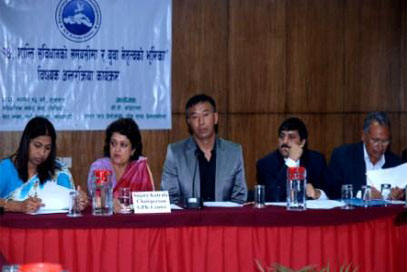GP Koirala Foundation for Democracy, Peace and Development organized discussion programs on July 29, 2011 and August 31, 2011 about the timeline of peace and constitution writing process and initiatives of youth leaders. The program was chaired by Sujata Koirala, the Chairperson of GP Koirala Foundation for Democracy, Peace and Development. Young leaders of different political parties participated in the discussion program.
Chairperson Koirala said that the first draft of the constitution couldn’t be achieved on the extended deadline because of the conflict among the political parties. She urged everyone to understand their responsibility and to contribute to end the political deadlock. Koirala highlighted the importance of the young leader’s role to find a clear thought inside the political parties and common understanding among the parties, at the time major political parties are diverted from the major issues. She stressed about the constructive role young leaders should play by supporting and pressuring the top leaders to find out the positive political roadmap.
PM Jhala Nath Khanal’s advisor Prakash Jwala, Nepali Congress Leader – former Speaker Chitra Lekha Yadav and Former Ministers Aftab Alam, Man Bahadur Bishokarma, Members of Constitutient Assembly, UML Leaders Pasang Sherpa (CA Member), Yogesh Bhattarai, Karna Bahadur Thapa, Maoist Leader Shiv Ram Yadav, Madhise Leader and former Minister Ms. Chanda Chaudhari, Sadbhawana Leader Sanjay Singh were present among the other youth leaders.
Prime Minister’s political advisor Prakash Jwala hoped that the contextual discussion would be very helpful to the national politics. Though the five point agreement created much hope, the delay in the implementation is frustrating, Jwala said. Ours leaders are habituated to work at the last hour and if they work honestly much works could be accomplished, he added. He pointed that if everyone was ready to solve the problems, then the problems weren’t difficult at all.
Nepali Congress leader and former minister Aftab Alam opined that if leaders were committed it’s possible to reach a conclusion. As there is dishonestly in establishing the democratic norms, the parliament will not be able to deliver the constitution as per the expectation of the citizens, he said. Until and unless Maoists give politics based on weapons, it’s impossible to complete the peace and constitution writing process, Alam said.
Madhesi leader Chanda Charudhary said that the old leadership hasn’t given ample opportunity to the young leaders though young leaders have always been at the front row in various agitations. She also argued that it’s the 10 leaders who are ruling the nation instead of 601 leader’s lawmakers. She also said three parties couldn’t make peace and constitution until and unless they move ahead with the Madhesi Morcha.
Leader of Nepali congress and former speaker Chitralekha Yadav questioned if the constitution could be written when only a few leaders agree to extend the constituent assembly deadline. She said that if the leaders are committed it wouldn’t difficult but the personal interest of leaders and their activities to halt the peace process is very dangerous. None of the parliaments in the country’s history would be as powerful as todays but it hasn’t been properly utilized, she said. Yadav also highlighted that the new constitution shouldn’t be like a single party’s manifesto. She also said that democratic constitution would be possible only after all youths unite.
However Nepal Sadhbhavana Party’s Sanjay Singh said that the major reason behind peace and constitution to be in dilemma is because madhesh issues are ignored.
Nepali Congress Leader Man Bahadur Bishokarma criticized the Maoist leaders for not being true to their words. He urged the youth leaders and lawmakers to think about their stand as the top leaders of the political parties take the major decisions.
Maoist leader Shivaram Yadav said youths mean thoughts. He said it was youths who demanded federation and republic. Unless and until people from traditional thought the program will remain as it is, he said. The main problem at present is, state reconstruction, he said. He said that marginal groups should be empowered. He asked Nepali congress to rethink about its position and all other parties to think seriously.
UML leader Pasang Sherpa also highlighted the situation of conflict among political parties and about youths who are unable to create pressure among political parties. He urged youths to play active role.
Nepali Congress leader Ram Chandra Pokhreal requested youths to speak about the obstruction created by the Maoists. He also requested youths to pressurize prime minister to resign and to create way for national consensus.
UML leader Yogesh Bhattarai urged everyone to unite for national consensus to solve all the problems and also said that completion of peace process is necessary for social transformation. Nepali Congress leader Ramhari Khatiwada said that its time to work together with co-operation instead of criticizing each other. He also challenged leaders to put their words into action.
UML leader Karna Bahadur Thapa criticized the leaders for failing to find find national concensus on the basis of thoughts and politics. He said that so far we have been only looking for consensus on the basis of power. He also charged youths for spending much of their time on power and not doing enough in their role. He also urged the youths to pressurize leaders to find the positive road map. However, some of the participants said the major problem of the nation was Maoist. They also said that they felt the absence of Maoist leaders in the program.
Executive Director of GPK Foundation Rakesh Hamal said that the program was organized to find out the ongoing problems and their solution. One of the objectives of the program was to create pressure by incorporating the ideas of youths. He also said that program would be beneficial to the youths.

